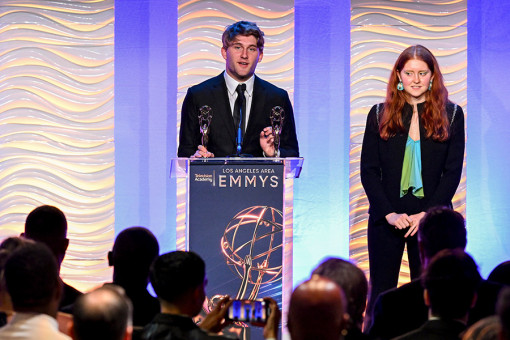Buildings and billboards in busy neighborhoods and public spaces such as The Grove in Los Angeles and Times Square in New York have lately sported colorful signage stating, "Dear Entertainment Industry, There is no diversity, equity and inclusion without disability."
The message — also featured in print, digital and audio ads — is part of "Disability Is Diversity," an effort to raise awareness of the nation's largest minority and to advocate for the employment and representation of people with disabilities in the entertainment industry.
With at least 20 percent of Americans — but only 1 percent of the industry — being disabled, "This is a catalyst," says Richie Siegel, president and cofounder of the Inevitable Foundation. The nonprofit, established last year to advance the hiring of midcareer scriptwriters with disabilities, launched the campaign in May.
"It starts the education process," Siegel explains. "People were saying, 'I only need disabled writers for disabled stories, because what else do they write about?'"
Plenty, according to Siegel, a former business strategist and analyst whose sister has epilepsy and other disabilities. In conversations about diversity, creatives and executives would say they were too busy focusing on race and gender to deal with disability. "Disabled people have all those things too, as far as we understand," Siegel says wryly.
Siegel had met Inevitable cofounder Marisa Torelli-Pedevska, who has chronic illnesses, when she was a counselor at a camp for people with developmental disabilities that his sister attended. For Torelli-Pedevska, who recently earned an MFA in film and TV writing from USC, "the intersection of screenwriting and disability was very organic and very personal." The two decided to focus on midcareer writers, in part because they could move up more quickly than emerging writers to positions of power, and thus, hiring and story decisions.
Among its programs, Inevitable awards $40,000 fellowships and continuing mentorship to select midcareer writers. One of its first fellows, Shani Am. Moore, is a writer and coproducer on Netflix's Sweet Magnolias. "Having a disability does not make someone a liability," says Moore, who lives with multiple sclerosis. "On the contrary, we are experts in adaptability and grit. By the time somebody with a disability has become a working writer, they have already overcome so many hurdles that breaking story on deadline is a walk in the park."
The "Disability Is Diversity" campaign is showing signs of success, Siegel reports. "We've heard from big executives and people running companies," he says. "It is starting to have an impact. We're thrilled with the response so far."
This article originally appeared in emmy magazine issue #9, 2022, under the title, "Vital Signs."












